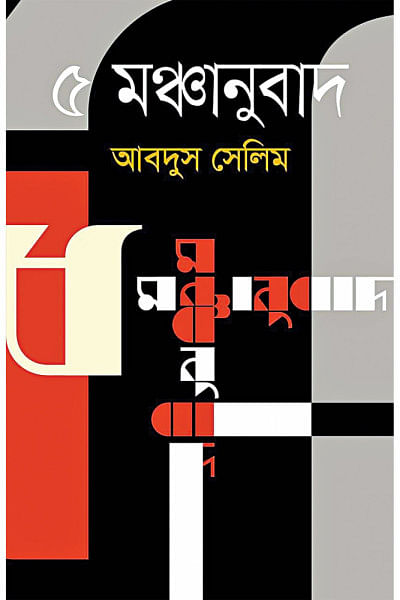Translation with a Midas touch

Abdus Selim, a noted Bangladeshi translator, playwright, essayist and educationist, has, of late, come up with a collection of five plays in Bangla translation titled Panch Manchanubad (Bangladesh Shilpakala Academy, 2021). The collection includes Endgame (1957) by Samuel Beckett, Love Letters (1988) by AR Gurney, Our Country's Good (1988) by Timberlake Wertenbaker, A Woman Alone (1977) by Dario Fo and Franca Rame, and The Vertical Hour (2006) by David Hare.
In his Introduction, Professor Selim details how the idea of the 'Theatre of the Absurd', during the days of his youth, exerted a deep influence on him. Such an influence, later, propelled him to translate Samuel Beckett's masterpiece, Endgame, into Bangla. Likewise, Timberlake Wertenbaker's quest for historicity, David Hare's progressive political thoughts and activism, and Dario Fo and Franca Rame's combined efforts to portray a woman's life, love, and confession all drove Selim to offer Bangla renditions of the plays.
The Bangla translation of the tragicomedy Endgame beautifully captures Beckett's worldview—the extreme futility of human life and the existential angst and despair. Professor Selim has remained thoroughly faithful to the original English text, preserving its conversational tone so as to let the major themes of loneliness and emptiness appear as they did in Beckett's original.
Similarly, historical facts are translated without any distortion in Our Country's Good. It can be challenging to translate a play with such a long list of characters written with the idea of "doubling" in mind, meaning that certain actors are meant to play more than one character. Ten actors play 22 roles in Wertenbaker's play. In handling the concept of doubling, the translator remains very conscious of the use of language as one character reappears with multiple roles with a certain lingual variation. So, Selim, in rendering the dialogues of the characters, had to follow the footsteps of the playwright.
One can easily assume Abdus Selim's ingenuity as a translator when going through the dialogues of the characters of The Vertical Hour who, we find, have engaged in opposing views regarding the invasion of Iraq by the US and its allied forces in 2003. The translation thoroughly captures the psychological tension between public and private lives during the war and it touches upon the vital aspects of atheism, the philosophy of Freud, terrorism, the ethnic cleansing project in Europe, and ethics of journalism and medical science.
It is important to note that Abdus Selim has translated arguably the best play, A Woman Alone, by the duo Fo and Rame. This rendition neatly brings forward the main theme of the play—the helplessness and mental agony of a woman in a patriarchal society. On the other hand, in translating Gurney's Love Letters, Professor Selim has changed the time frame and the names of characters and places, but the deviation most notably does not bring about any change to the plot. The play, originally written in the backdrop of WWI, has been rendered in Bangla against the backdrop of 1971. This bold bit of recontextualising was an effort on Selim's part to draw modern relevance to the work and in doing this, the translator considers Panch Manchanubad an adaptation rather than a straightforward translation.
Three of the aforesaid plays have been performed by different troupes in Bangladesh, earning adulations at home and abroad. Love Letters and Endgame have not yet been staged—the late Aly Zaker was set to perform Love Letters along with Ferdousi Mazumder, before his sudden passing put a stop to the project temporarily.
Without an iota of doubt, Abdus Selim has left an indelible mark on drama enthusiasts through his Bangla renditions of these plays. Their stage performances have sharpened my social and political consciousness in many ways.
Tusar Taluker teaches English literature at Central Women's University, Dhaka. He can be reached at [email protected].

 For all latest news, follow The Daily Star's Google News channel.
For all latest news, follow The Daily Star's Google News channel. 



Comments